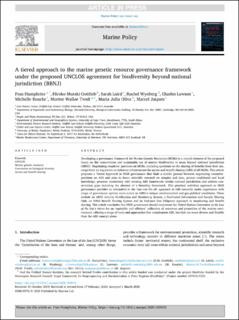A tiered approach to the marine genetic resource governance framework under the proposed UNCLOS agreement for biodiversity beyond national jurisdiction (BBNJ)
Humphries, Fran; Gottlieb, Hiroko Muraki; Laird, Sarah; Wynberg, Rachel; Lawson, Charles; Rourke, Michelle; Walløe, Morten Tvedt; Oliva, Maria Julia; Jaspars, Marcel
Peer reviewed, Journal article
Published version

Åpne
Permanent lenke
https://hdl.handle.net/11250/3031832Utgivelsesdato
2020Metadata
Vis full innførselSamlinger
- Artikler [407]
- Publikasjoner fra Cristin [424]
Sammendrag
Developing a governance framework for Marine Genetic Resources (MGRs) is a crucial element of the proposed treaty on the conservation and sustainable use of marine biodiversity in areas beyond national jurisdiction (BBNJ). Negotiating countries’ positions on MGRs, including questions on the sharing of benefits from their use, range from no regulation to elaborate infrastructure for access and benefit sharing (ABS) of all MGRs. This article proposes a Tiered Approach to MGR governance that finds a middle ground between negotiating countries’ positions on ABS and aims to foster scientific research on samples and data, protect traditional and local knowledge, promote consistency with existing ABS frameworks within national jurisdiction and address conservation gaps including the absence of a biosafety framework. This practical activities approach to MGR governance provides an alternative to the ‘one size fits all’ approach to ABS currently under negotiation with range of governance options more suited to ABNJ’s unique environmental and geo-political conditions. These include an ABNJ Activity Notification and Monitoring System, a Facilitated Information and Sample Sharing Hub, an ABNJ Benefit Sharing System and an End-user Due Diligence approach to monitoring and benefit sharing. This article concludes that MGR governance should implement the United Nations Convention on the Law of the Sea’s vision for an ‘equitable and efficient’ utilisation of resources and protection of the marine environment, offering a range of tools and approaches that complement ABS, but that are more diverse and flexible than the ABS concept alone
